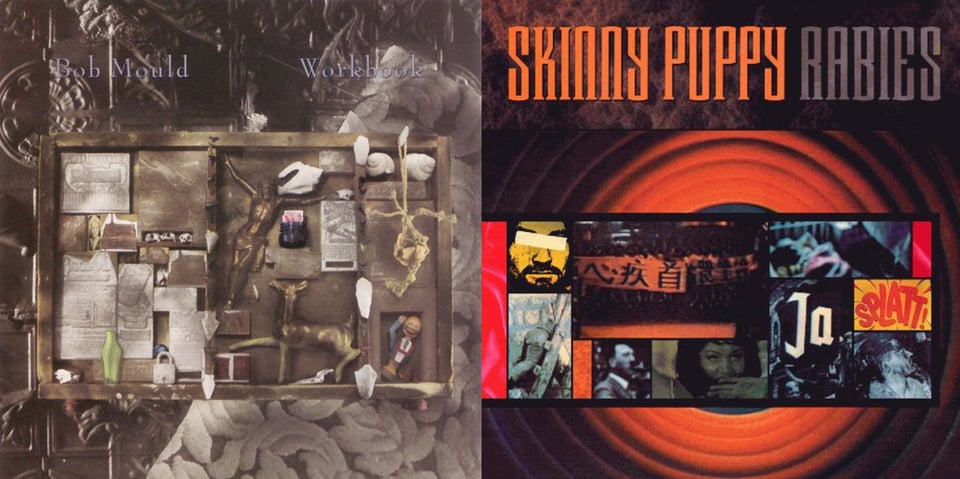#285 The Best Album of 1989, Round 1 Match #43: Bob Mould vs. Skinny Puppy

Hey folks!

Today’s Best Album of 1989 match is:
#26 Bob Mould, WORKBOOK
vs.
#103 Skinny Puppy, RABIES
To vote, follow this link to the Google Form. You will need a Google login to vote. If you can’t or won’t have one, let me know ASAP (either through this newsletter, my email [kentmbeeson@hey.com] or on the Best Album Brackets Bluesky account) and I’ll see what I can do.
We have a Designated Cheerleader today, it’s from Head Cheerleader @bsglaser.bsky.social, and it’s for WORKBOOK! Take it away, Brian!
Some artists figure out how to change, and some don't. The Ramones, to take an obvious example, did one thing, did it better than anyone, and essentially spent their whole career doing it; The Clash, on the other hand, started out inspired by The Ramones, but later were able to branch out in multiple directions while still keep their Clash core. And there are artists that get a lot of latitude to change things up--Neil Young is the most obvious, along with Bob Dylan, Joni Mitchell, and Lou Reed--but fans and critics will only follow them so far from the core approach before calling foul.
Bob Mould is, for the most part, an artist with a lane: hook-laden pop songs drowned in noise and played with speed and aggression. Remember the first time you heard "Celebrated Summer" on NEW DAY RISING and how jarring the acoustic guitar intro was? I mean, the tune kicked into gear, but it was still right on the edge of heresy to hear a non-electric guitar on one of Mould's Hüsker Dü songs. And over the course of his career, Mould's best records have stayed in his lane: Sugar's COPPER BLUE was power-trio noise pop, and the records he's made with Jason Narducy and Jon Wurster follow the same formula. Which isn't a criticism--Mould helped shape that formula, and he's great at it.
But he's also changed it up every now and then, and his first big move was making WORKBOOK in the wake of Hüsker Dü's breakup. It opens with "Sunspots," a gentle instrumental that layers acoustic and non-distorted electric guitars; the precedents are folks like Leo Kottke and Richard Thompson rather than punk and hardcore. (RT's influence is, in fact, all over this record, and Mould covered him on the WORKBOOK tour.) If you thought solo Mould was going to be Hüsker Dü minus Grant Hart, this first track makes it crystal-clear that you're getting something else.
And what you get is a breakup record. Not a romantic breakup, but something equally close and hard--a dissolution of a creative and social relationship that had been as intense as the records Hüsker Dü made during its brief lifespan. As such, the songs are angry ("Poison Years"), sad ("Lonely Afternoon"), and bewildered ("Brasilia Crossed With Trenton"), sometimes separately and sometimes all at once ("Heartbreak a Stranger"). The songs ask, "Who am I without you?" and don't come to satisfying answers.
But the music? Immensely satisfying. Like most of the best Bob Mould recordings, the songwriting is bang-on target; at least half of these songs still appear on live setlists more than 25 years later. And not only does he dial down the volume overall, but there's a cello in the band, adding textures and colors that hadn't been available to Mould before. By the time he gets back to a full electric rage on the final track, "Whichever Way the Wind Blows," Mould's been through it all. The emotions are right at the surface throughout, fresh and festering as a wound, and WORKBOOK is a compelling end-to-end listen. Mould would quickly revert back to form (with later sidesteps into electronic music that were NOT as well-received as this), but WORKBOOK stands as an important pivot point in his career.
I also want to take a moment to note that WORKBOOK came out in May 1989, just a few months before Grant Hart put out his post-Dü LP, INTOLERANCE. Like WORKBOOK, it drops the Hüsker sound for a wider palette and is driven by despondency, rage, and regret. It might not be entirely up to par with WORKBOOK, but boy does it come close; and if I'm being honest, the single best individual song across the two records isn't "See a Little Light" or anything on WORKBOOK--it's Hart's "2541," maybe the best extended metaphor for the arc of a relationship I've ever heard. I can barely tolerate the fact that INTOLERANCE isn't in the '89 tourney, and you should go listen to "2541" right now.
Thanks once again, Brian!
Click here to see the current results for the entire tournament, and click here to see the current results for the prediction bracket contest.
Yesterday, #58 Boogie Down Productions, GHETTO MUSIC: THE BLUEPRINT OF HIP HOP defeated #71 Young MC, STONE COLD RHYMIN’, 56-39-1.
Thanks for voting!
Kent
Add a comment: